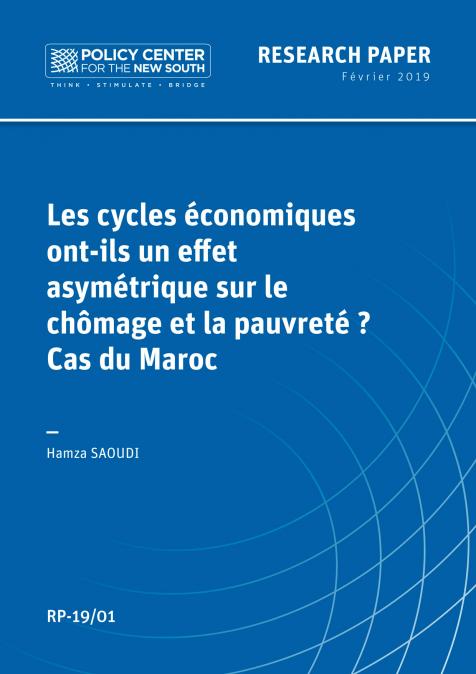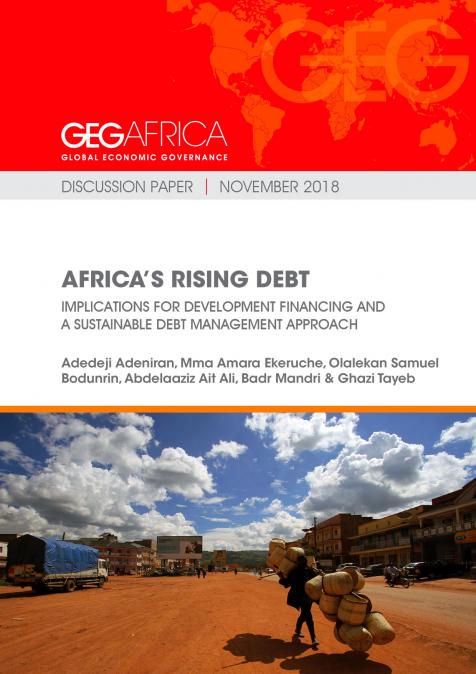RELATED CONTENT
-
La transformation structurelle au Maroc et Chaînes de Valeurs Mondiales : Une vulgarisation du débatAuthorsYassine MsadfaFebruary 25, 2019La transformation structurelle d’une économie demeure un point de passage nécessaire pour toute nation qui souhaite gravir les échelons du développement, cette transformation est souvent tributaire de la capacité d’une économie à s’ériger d’une société agraire de subsistance, dans son stade initial, vers une économie de productivité. Pour ce qui est du Maroc, le débat a pris de l’ampleur quant à la capacité des dynamiques actuelles à accélérer le rythme de l’activité économique au p ...
-
AuthorsFebruary 20, 2019Ce papier évalue les effets asymétriques des cycles économiques sur le chômage et la pauvreté au Maroc, à travers un modèle VAR estimé sur des données trimestrielles allant de 2003 à 2012. Ce modèle inclut les composantes cycliques de quatre variables à savoir : l’output-gap, le salaire minimum réel, le taux de chômage et le taux de pauvreté. Afin de tester la robustesse des résultats, deux versions du modèle VAR ont été estimées, en utilisant les composantes cycliques calculées se ...
-
AuthorsFebruary 12, 2019This study was carried out within the framework of the Global Economic Governance Africa (GEGAfrica) funded by the UK Department for International Development. The GEGAfrica programme is a policy research and stakeholder engagement aimed at strengthening the influence of African coalitions at global economic governance forums and increase, inter alia, the visibility and the outreach of African views at the regional and worldwide levels. Policy Center for the New South was requested ...
-
AuthorsFebruary 6, 2019Ce papier examine la plainte initiée par la Turquie devant l’Organisation mondiale du commerce (OMC) contre le Maroc au sujet des droits antidumping appliqués aux produits d’acier laminés à chaud. La plainte de la Turquie constitue à la fois un précédent et une opportunité. Un précédant d’abord, car jamais le Maroc n’a été impliqué, ni en qualité de partie plaignante ni en qualité de partie défenderesse, dans une affaire devant le GATT ou l’OMC. Une opportunité ensuite, par ce que l ...
-
AuthorsFebruary 6, 2019This paper examines Turkey's case against Morocco before the World Trade Organization (WTO), over anti-dumping duties on hot-rolled steel products. Turkey's complaint constitutes both a precedent and an opportunity. First, it is a precedent in that Morocco was previously never involved in a case before GATT or WTO, neither as a plaintiff nor as a defendant. Second, it is an opportunity as the evaluation of the legal process of the complaint enables an assessment of adequacy of Moroc ...
-
 AuthorsJanuary 31, 2019Without reforms, financial markets’ optimism may crumble – and bring the house down. Judging by the reaction of financial markets, the Brazilian economy started the year at high speed. The real is among the world’s best-performing currencies so far in 2019 and the main stock market index Ibovespa hit a string of record highs leading into last week, when it broke the 97,000-point mark. Future interest rates have fallen sharply. Foreign investors are buying in as well. The pre ...
AuthorsJanuary 31, 2019Without reforms, financial markets’ optimism may crumble – and bring the house down. Judging by the reaction of financial markets, the Brazilian economy started the year at high speed. The real is among the world’s best-performing currencies so far in 2019 and the main stock market index Ibovespa hit a string of record highs leading into last week, when it broke the 97,000-point mark. Future interest rates have fallen sharply. Foreign investors are buying in as well. The pre ... -
 AuthorsMouhamadou Moustapha LyJanuary 30, 2019En l’espace d’une année, la Banque mondiale (BM) a enregistré deux démissions parmi son top management. Il y a douze mois (Janvier 2018), Paul Romer quittait la Banque mondiale pour retourner dans le monde académique. Au début de ce mois de janvier 2019, Jim Yong Kim annonce son départ de la présidence de la même institution pour rejoindre une autre spécialisée dans le financement des infrastructures. Pour Paul Romer, les critiques à l’endroit du classement Doing Business, et ...
AuthorsMouhamadou Moustapha LyJanuary 30, 2019En l’espace d’une année, la Banque mondiale (BM) a enregistré deux démissions parmi son top management. Il y a douze mois (Janvier 2018), Paul Romer quittait la Banque mondiale pour retourner dans le monde académique. Au début de ce mois de janvier 2019, Jim Yong Kim annonce son départ de la présidence de la même institution pour rejoindre une autre spécialisée dans le financement des infrastructures. Pour Paul Romer, les critiques à l’endroit du classement Doing Business, et ... -
 AuthorsJanuary 16, 2019The trade war between China and the United States roils stock markets, and the World Trade Organization is at risk of extinction because major players ignore its rules. But the fierce controversy surrounding the Global Compact on Migration, a mild and non-binding document which several of the countries gathered in Marrakesh – including about one-third of EU members - refused to sign, shows that migration is even more radioactive than trade. As they face a backlash against globalizat ...
AuthorsJanuary 16, 2019The trade war between China and the United States roils stock markets, and the World Trade Organization is at risk of extinction because major players ignore its rules. But the fierce controversy surrounding the Global Compact on Migration, a mild and non-binding document which several of the countries gathered in Marrakesh – including about one-third of EU members - refused to sign, shows that migration is even more radioactive than trade. As they face a backlash against globalizat ... -
 AuthorsJanuary 14, 2019Last week Jim Yong Kim, president of the World Bank, unexpectedly announced his resignation, effective as soon as next month and three and a half years prior to the end of his second mandate. Given the current environment of challenged and weakened multilateralism, the aftermath of his succession has a relevance that transcends the limits of that institution. While an analyst has alluded to President Kim as “voting with his feet” on the World Bank's loss of significance i ...
AuthorsJanuary 14, 2019Last week Jim Yong Kim, president of the World Bank, unexpectedly announced his resignation, effective as soon as next month and three and a half years prior to the end of his second mandate. Given the current environment of challenged and weakened multilateralism, the aftermath of his succession has a relevance that transcends the limits of that institution. While an analyst has alluded to President Kim as “voting with his feet” on the World Bank's loss of significance i ... -
AuthorsMichael BaltenspergerJanuary 13, 2019China’s Belt and Road Initiative (BRI) is an international trade and development strategy. Launched in 2013, it is one of the ways China asserts its role in world affairs and captures the opportunities of globalisation. The BRI has the potential to enhance development prospects across the world and in China, but that potential might not be realised because the BRI’s objectives are too broad and ill-defined, and its execution is too often non-transparent, lacking in due diligence and ...







